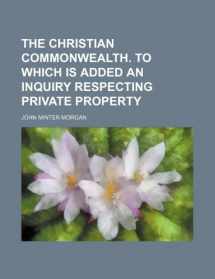
The Christian commonwealth. To which is added an inquiry respecting private property
ISBN-13:
9781236117052
ISBN-10:
1236117050
Author:
John Minter Morgan
Publication date:
2012
Publisher:
Rarebooksclub.com
Format:
Paperback
38 pages
FREE US shipping
Book details
ISBN-13:
9781236117052
ISBN-10:
1236117050
Author:
John Minter Morgan
Publication date:
2012
Publisher:
Rarebooksclub.com
Format:
Paperback
38 pages
Summary
The Christian commonwealth. To which is added an inquiry respecting private property (ISBN-13: 9781236117052 and ISBN-10: 1236117050), written by authors
John Minter Morgan, was published by Rarebooksclub.com in 2012.
With an overall rating of 4.2 stars, it's a notable title among other
books. You can easily purchase or rent The Christian commonwealth. To which is added an inquiry respecting private property (Paperback) from BooksRun,
along with many other new and used
books
and textbooks.
And, if you're looking to sell your copy, our current buyback offer is $0.43.
Description
This historic book may have numerous typos and missing text. Purchasers can download a free scanned copy of the original book (without typos) from the publisher. Not indexed. Not illustrated. 1850 Excerpt: ...and reconciled many to the existence of misery which was considered irremediable. The first, I believe, who started this idea was Wallace, in his work on the "Prospect and Numbers of Mankind;" who, after describing the wonders that man would achieve, and the happiness he would enjoy, when correct principles of Christian Association were adopted, all at once discovered the evils that might ensue from overwhelming numbers, and immediately abandoned the beautiful fabric he had reared. Mr. Malthus, although a man of benevolence, but having little sympathy or confidence in the brighter prospects of Mr. Wallace, took up the principle of population, and endeavoured, by statistical inquiries regarding the progress of different countries, to prove, that if unimpeded by crime, misery, famine, or war, the population would double every twentyfive years. Aware that the causes of retardation which he had pointed out, might by some be considered as necesary to ward off a still greater evil, Mr. Malthus was earnest in urging attention to what he called the Moral Check, and to the necessity of instructing all classes as to the inevitable consequences of marriages too early contracted. Whatever arguments may have been adduced in opposition to the various systems which the work of Mr. Malthus was intended to refute, and they were obnoxious to many, that founded on the principle of population was altogether irrelevant, unless, instead of admitting the superiority of those systems in moral culture, he had found them more deficient than the present; for whatever tended to improve the moral feelings, to enlarge the mind, to make men more observant, not only of the immediate, but the more remote, consequences of their conduct, would render less probable any improvident m...


We would LOVE it if you could help us and other readers by reviewing the book
Book review

Congratulations! We have received your book review.
{user}
{createdAt}
by {truncated_author}


